-

新人教版高中英语必修2Unit 1 Cultural Heritage-Reading and Thinking教案二
1. This section focuses on "Understanding how a problem was solved”, which is aimed to guide students to analyze and discuss the challenges and problems faced by cultural heritage protection during the construction of Aswan Dam, as well as the solutions. On the basis of understanding, students should pay attention to the key role of international cooperation in solving problems, and attach importance to the balance and coordination between cultural heritage protection and social and economic development. Students are encouraged to face challenges actively, be good at cooperation, and make continuous efforts to find reasonable ways and means to solve problems.2. Enable students to understand the main information and text structure of the reading text;3. Motivate students to use the reading strategy "make a timeline" according to the appropriate text genre;4. Enable students to understand how a problem was solved;5. Enable students to understand the value of protecting cultural heritage by teamwork and global community;1. Guide students to pay attention to reading strategies, such as prediction, self-questioning and scanning.2. Help students sort out the topic language about protecting cultural relics and understand the narrative characteristics of "time-event" in illustrative style3. Lead students to understand the value of protecting cultural heritage by teamwork and global community;

新人教版高中英语必修2Unit 2 Wildlife Protection-Discovering Useful Structure教案二
2.表示现阶段正在进行的被动动作(该动作在说话的瞬间未必正在进行)。Many interesting experiments are being carried out these days.(说话时,并不一定正在进行)3.表示一种经常性的被动行为,常和always,constantly 等表示频度的副词连用,这种用法常常带有赞扬或厌恶的感情色彩。He is always being praised by the leader.4.表示按计划或安排主语将要承受谓语动词所表示的动作(仅限于少数及物动词)。A party is being held tonight.Step 4 Special cases1.像take care of, look after, talk about, think of等动词与介词构成的短语用于现在进行时的被动语态时, 其中的介词不可省略。The ways to stop illegally hunting are being talked about. 2.可与部分情态动词连用,表示对正在发生的事情的推测。She may be being punished by her mother.3.有时可表示按计划或安排将要进行的一个被动动作。A celebration is being held this weekend for his success.4.某些表示“状态、心理活动、存在”等的动词,如have,want,need,love,一般不用现在进行时的被动语态,而常用一般现在时的被动语态。With the population increasing,more land is needed.5.“be+under/in+n.”可表示现在进行时的被动意义。My computer is under repair.=My computer is being repaired.

新人教版高中英语必修2Unit 3 The Internet-Listening &Speaking&Talking教案二
From the pictures in the text and the title--- choose the best app, we can know that this part is about how to save money by using apps.Step 2 While-listening1. Laura and Xiao Bo are talking about apps. Listen to their conversation and find out what apps they want.Xiao Bo is looking for a(n) exercise app to help him get in shape.Laura would like an app for getting rich and another that will make her grades better.2. Listen again. Are the sentences true T or false F?1). Both of Xiao Bo's apps keep track of the steps he takes._____2). Xiao Bo's second app can help him make a fitness plan._____3). Laura needs an app that will help her get discounts.______4). Laura needs an app that will add money to her bank account._______F T F T3. Listen once more and tick the sentence you hear. Underline the words used to express predictions, guesses, and beliefs.Predictions, Guesses, and Beliefs________It might help me walk more.________My guess is that it wouldn't work.________I imagine this app would help me get fit faster________I suppose that would be good.________I guess you could save a little with this app.________I suppose there would be some problems, too.________I believe this app could help me get thinner.

新人教版高中英语必修2Unit 3 The Internet-Reading and Thinking教案二
Q5:What's Jan's next goal?Her next goal is to start a charity website to raise money for children in poor countries.Q6:What can we learn from her experiences?We learn that when we go through tough times, we can find help and support from other people online. We learn that we can feel less lonelyStep 5: While reading---rethinkingQ1: What is Jan’s attitude to the Internet ?Thankful/Grateful, because it has changed her and her life.Q2: What writing skills is used in the article ?Examples(Jan’s example, the 59-year-old man’s and the 61-year-old woman’s example)Q3: Can you get the main idea of the article ?The Internet has changed Jan’s life/Jan’s life has been changed by the Internet.Step 6 Post reading---Retell the storyMuch has been written about the wonders of the World Wide Web. There are countless articles (1)telling(tell) us how the Internet has made our lives more convenient. But the Internet has done a lot (2)more(much) for people than simply make life more convenient. People’s lives (3) have been changed(change) by online communities and social networks so far. Take Jan for example, who developed a serious illness that made her (4)stuck(stick) at home with only her computer to keep (5)her(she) company. She joined an online group (6)where she could share problems, support and advice with others. She considered the ability to remove the distance between people as one of the greatest (7)benefits(benefit). She was so inspired (8)that she started an IT club in which many people have been helped. She has started to learn more about how to use the Internet to make society better. Her next goal is to start a charity website to raise money (9)for children in poor countries. Jan’s life has been (10)greatly(great) improved by the Internet.

新人教版高中英语必修2Unit 4 History and Traditions-Discovering Useful Structure教案二
This teaching period mainly deals with grammar: The past participle is used as attributive and objective complement.1. Guide students to review the basic usages of the past participle used as attributive and objective complement.2. Lead students to learn to use some special cases concerning the past participle used as attributive and objective complement flexibly.3. Strengthen students’ great interest in grammar learning.1. Help students to appreciate the function of the past participle used as attributive and objective complement.2. Instruct students to write essays using the past participle used as attributive and objective complement.Step1:温故而知新。Analyze the underlined phrases and then sum up the common usages of the past participles.1.(教材P41)They had castles built(build) all around England, and made changes to the legal system.2.(教材P42)They use the same flag, known(know) as the Union Jack,...3.(教材P42)Judy and I had our car parked(park) in an underground car park near Trafalgar Square, where we could get our car battery charged(charge).Common points: f the past participle used as attributive and objective complement.Step 2:过去分词作定语时的意义1.及物动词的过去分词作定语,在语态上表示被动;在时间上,常表示动作已经发生或完成,有时也不表示时间性。Our teacher watched us doing the experiment and gave us a satisfied smile at last.我们的老师看着我们做实验,最后给了我们一个满意的微笑。The plan put forward at the meeting will be carried out soon.会上提出的计划将很快被执行。2.不及物动词的过去分词作定语,它不表示被动意义,只强调动作完成。Many little kids like gathering fallen leaves in the yard.

新人教版高中英语必修2Unit 4 History and Traditions-Reading and Thinking教案二
Step 5 While reading---Task 3Read the text again and answer the following questions.Q1: How many countries does the UK consist of ?4 Q2: What are the four countries of the United Kingdom?England, Wales, Scotland and Northern Ireland Q3: Which two were the first to be joined together ?England and WalesQ4: What are the two chief advantages of studying the history of a country ?The first one is to help you understand more about the country and its traditions.The second one is to make visiting it more enjoyable.Q5: What’s the author’s attitude towards studying the history ?Supportive/positiveStep 6 Post reading---Retell the textThe United Kingdom, Great Britain, Britain, England—many people are confused by (1)_____ these different names mean. In the 16th century, the nearby country of Wales (2) __________(join) to the Kingdom of England. In the 19 th century, the Kingdom of Ireland was added to create the United Kingdom of Great Britain and Ireland. Finally, the southern part of Ireland (3) ______ (break) away from the UK, which resulted in the full name we have today. However, most people just use the (4)_________(shorten) name: the UK. The four countries (5)__________ belong to the United Kingdom work together in some areas. There were four sets of invaders and the last group were the Normans. They had castles (6)_________(build) all around England and made changes (7)__________ the legal system. Studying the history of the country will make your visit much more (8)_________(enjoy). The capital city London is (9)___ ancient port city that has a history (10)______(date) back to Roman times. 1. what 2.was joined 3.broke 4.shortened 5.that 6. built 7.to 8.enjoyable 9.an 10.dating Step 6 Homework
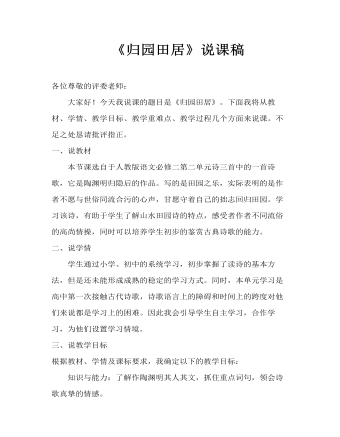
高中语文人教版必修二《归园田居》说课稿
一、说教材本节课选自于人教版语文必修二第二单元诗三首中的一首诗歌,它是陶渊明归隐后的作品。写的是田园之乐,实际表明的是作者不愿与世俗同流合污的心声,甘愿守着自己的拙志回归田园。学习该诗,有助于学生了解山水田园诗的特点,感受者作者不同流俗的高尚情操,同时可以培养学生初步的鉴赏古典诗歌的能力。
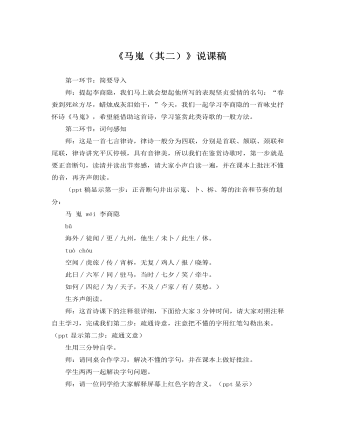
人教版高中语文必修3《马嵬(其二)》说课稿
生2:颔联的意思是只听到禁卫军中传来夜间巡逻的梆子声,不再向宫中那样安逸地听到有鸡人打鸣报时的声音了。生3:颈联的意思是说事变发生那天军队发生哗变停留不前,但当年唐玄宗以为自己可以和贵妃天天在一起,对天上的牵牛和织女一年一度的会见还加以嘲笑呢。生4:尾联的含义是为什么唐玄宗当了四十五年的皇帝,还不如普通百姓夫妻恩爱,长相厮守。师:好的。请大家再齐读一遍诗文,做到人人都能疏通诗的含义。学生再次齐读。第三环节:专项探究师:白居易曾说:“文章合为时而著,歌诗合为事而作。”这首诗就是作者途经马嵬驿,咏马嵬之变这一历史事件而作,所以我们鉴赏的第三步,就是通过标题和诗文,弄清诗中的历史事件。请同学们找出诗中哪些诗句描述了这一事件?
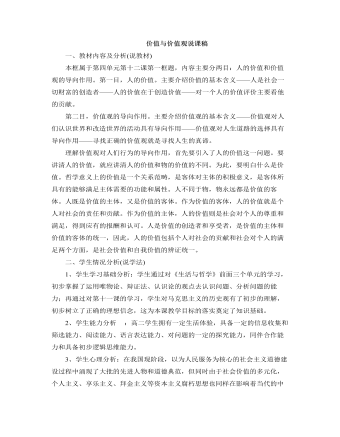
人教版高中政治必修4价值与价值观说课稿(二)
二、学生情况分析(说学法)1、学生学习基础分析:学生通过对《生活与哲学》前面三个单元的学习,初步掌握了运用唯物论、辩证法、认识论的观点去认识问题、分析问题的能力;再通过对第十一课的学习,学生对马克思主义的历史观有了初步的理解,初步树立了正确的理想信念,这为本课教学目标的落实奠定了知识基础。 2、学生能力分析 :高二学生拥有一定生活体验,具备一定的信息收集和筛选能力、阅读能力、语言表达能力、对问题的一定的探究能力,同伴合作能力和具备初步逻辑思维能力。3、学生心理分析:在我国现阶段,以为人民服务为核心的社会主义道德建设过程中涌现了大批的先进人物和道德典范,但同时由于社会价值的多元化,个人主义、享乐主义、拜金主义等资本主义腐朽思想也同样在影响着当代的中学生。
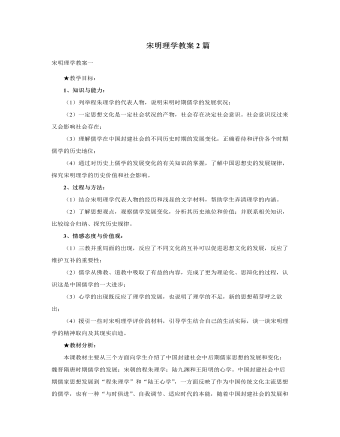
人教版高中历史必修3宋明理学教案2篇
二、程朱理学:1、宋代“理学”的产生:(1)含义:所谓“理学”,就是用“理学”一词来指明当时两宋时期所呈现出来的儒学。广义的理学,泛指以讨论天道问题为中心的整个哲学思潮,包括各种不同的学派;狭义的理学,专指程颢、程颐、朱熹为代表的,以“理”为最高范畴的学说,称为“程朱理学”。理学是北宋政治、社会、经济发展的理论表现,是中国古代哲学长期发展的结果,是批判佛、道学说的产物。他们把“理”或“天理”视作哲学的最高范畴,认为理无所不在,不生不灭,不仅是世界的本原,也是社会生活的最高准则。在穷理方法上,程颢“主静”,强调“正心诚意”;程颐“主敬”,强调“格物致知”。在人性论上,二程主张“去人欲,存天理”,并深入阐释这一观点使之更加系统化。二程学说的出现,标志着宋代“理学”思想体系的正式形成。【合作探究】宋代“理学”兴起的社会条件:

人教版高中语文必修3《劝学》教案2篇
五.研习第一段:1.诵读指导要处理好句中停顿2.请学生对照注释翻译本段重点词句:学不可以已已:停止。青,取之于蓝而青于蓝于:从;比。木直中绳中:zhàng符合,合于。虽有槁暴,不复挺者,揉使之然也有通又,揉通煣,以火烘木,使其弯曲。然:这样。翻译:故木受绳则直,金就砺则利,君子博学而日参省乎己,则知明而行无过矣。所以木材经墨线画过(再用斧锯加工)就直了,金属刀剑拿到磨刀石上(磨过)就锋利了,君子广博地学习并且每天对自己检验反省,就能智慧明达,行为没有过错了。3.本段是从哪个角度论述中心论点的?明确:本段是从学习的意义这个角度论述中心论点的。荀子认为人的知识、道德、才能都不是天生成的,而是后天不断学习获得的,学习的意义十分重大,所以学习不能停止。4.本段中几个比喻句是为了说明什么道理?学生讨论发言,教师明确:
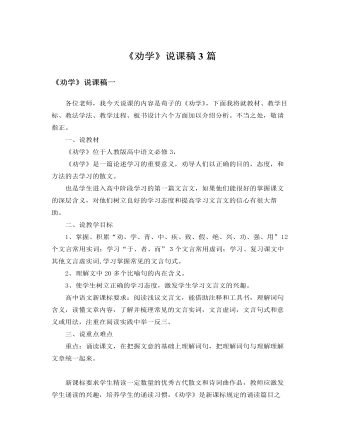
人教版高中语文必修3《劝学》说课稿3篇
《劝学》是普通高中课程标准试验教科书语文必修三第三单元的重点篇目,该文集中反映著名思想家荀子在学习问题上的观点和精彩斐然的论证艺术。该单元所选课文都是古代的议论性散文。通过本单元的学习在于让学生感受我国传统文化的精神,掌握基础的文言语法知识,学习如何清晰有力的表达自己的思想和见解。本文安排在单元的第一篇,如何指导学生学好这篇课文,是实现“授之以渔”,树立学生学好文言文的信心,掌握文言学习方法的关键。根据新课标倡导从“知识与能力”、“过程与方法”、“情感态度与价值观”三方面出发设计课程目标的要求和高一的学生对于文言文的知识还在积累的阶段,应该注重基础知识的积累和一定量的诵读的实际情况。我拟确定以下教学目标:1,了解荀子论述学习的思想,明确学习要靠积累、坚持不懈、专心致志的道理。2,掌握积累文言实词、虚词,活用、古今异议等现象和固定句式。

人教版高中历史必修3宋明理学说课稿3篇
陆王心学与程朱理学相比有何异同?生 不同点:在理的内涵上不同,程朱理学认为“理”是贯通于宇宙、人伦的客观存在,是一种普遍的规律准则;陆王心学认为心即理,是“良知”,认为人心便是世界万物的本原。方法上也有不同:前者向外追究,“格物致知”;后者向内探求,“发明本心”以求理,克服私欲、回复良知。生 相同点:都提出了一个宇宙、社会、人生遵循的“理”。师 对。程朱理学是客观唯心主义,阳明心学是主观唯心主义。这两者的分歧是理学范围内的分歧,其基本思想是一致的。师 宋明理学与汉唐以前的儒学比较,最大的特点在于批判地吸收了佛教哲学的思辨结构和道教的宇宙生成论,将儒家的伦理学说概括升华为哲学基本问题。其实质是把佛、道“养性”“修身”引向儒家的“齐家”“治国”“平天下”,对儒家的纲常道德给予哲学论证,使之神圣化、绝对化、普遍化,以便深入人心,做到人人遵而行之。

人教版高中政治必修4生活处处有哲学说课稿
(二)组织学生探究知识并形成新的知识。我从学生的生活体验入手,运用案例等形式创设情境呈现问题,使学生在自主探索、合作交流的过程中,发现问题、分析问题、解决问题,在问题的分析与解决中主动构建知识。主要通过几幅漫画让学生思考其中的哲学道理,开始接触哲学。漫画一:种瓜得瓜,种豆得豆,种鸡蛋得??漫画二:甲:下雨好极啦!乙:下雨糟透了!漫画三:——狂妄之徒,你竟然坏了祖上规矩!在引导学生思考、体验问题的过程中,可以使学生逐步学会分析、解决问题的方法。这样做既有利于发展学生的理解、分析、概括、想象等创新思维能力,又有利于学生表达、动手、协作等实践能力的提高,促进学生全面发展,力求实现教学过程与教学结果并重,知识与能力并重的目标。
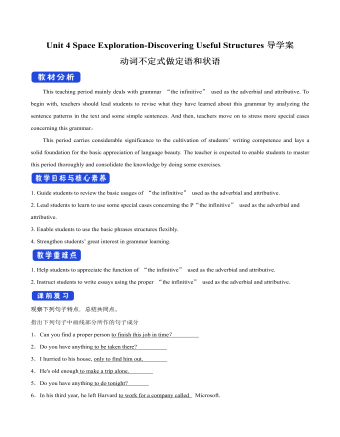
新人教版高中英语必修3Unit 4 Space Exploration-Discovering Useful Structures导学案
【点津】 1.不定式的复合结构作目的状语 ,当不定式或不定式短语有自己的执行者时,要用不定式的复合结构?即在不定式或不定式短语之前加 for +名词或宾格代词?作状语。He opened the door for the children to come in. 他开门让孩子们进来。目的状语从句与不定式的转换 英语中的目的状语从句,还可以变为不定式或不定式短语作状语,从而使句子在结构上得以简化。可分为两种情况: 1?当目的状语从句中的主语与主句中的主语相同时,可以直接简化为不定式或不定式短语作状语。We'll start early in order that/so that we may arrive in time. →We'll start early in order to/so as to arrive in time. 2?当目的状语从句中的主语与主句中的主语不相同时,要用动词不定式的复合结构作状语。I came early in order that you might read my report before the meeting. →I came early in order for you to read my report before the meeting.
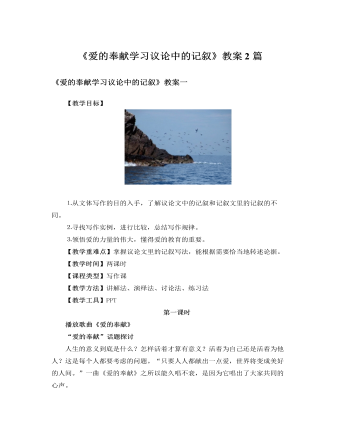
人教版高中语文必修3《爱的奉献学习议论中的记叙》教案2篇
方法点拨教师:有的同学叙述事实论据时,不突出重点和精华,不注意取舍,水分太多,有许多的叙述描写,有时还有详细的故事情节,文章几乎成了记叙文,使文章的论点无法得到充分的证明,这是写议论文的大忌。那么:议论文中的记叙有哪些特点?同学各抒己见。投影显示:1.议论中的记叙不是单纯的写人记事,记叙文字是为议论服务的,其目的是为作者所阐明的道理提供事实依据。所以,在记叙时要求简洁、概括,舍弃其中的细节,仅仅交代清楚事件或者人物的概貌即可,一般不在各种描写手段上下功夫,只要把能证明观点的那个部分、侧面交代清楚就行了。2.议论文中的记叙性文字不得超过总字数的1/3,否则视为文体不当。能力提升一、教师:了解了议论文中的记叙的特点,接下来我们看看今天的话题:“爱的奉献”,你想从哪个角度立论?有哪些素材?
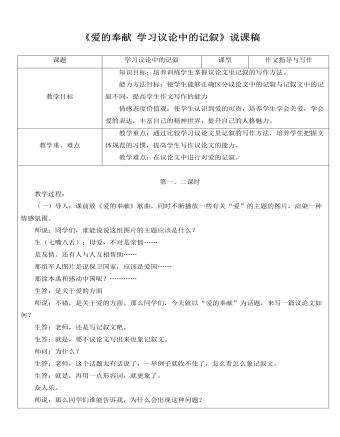
人教版高中语文必修3《爱的奉献 学习议论中的记叙》说课稿
教学过程:(一)导入:课前放《爱的奉献》歌曲,同时不断播放一些有关“爱”的主题的图片,渲染一种情感氛围。师说:同学们,谁能说说这组图片的主题应该是什么?生(七嘴八舌):母爱,不对是亲情……是友情、还有人与人互相帮助……那组军人图片是说保卫国家,应该是爱国……那徐本禹和感动中国呢?…………生答:是关于爱的方面师说:不错,是关于爱的方面。那么同学们,今天就以“爱的奉献”为话题,来写一篇议论文如何?生答:老师,还是写记叙文吧。生答:就是,要不议论文写出来也象记叙文。师问:为什么?生答:老师,这个话题太有话说了,一举例子就收不住了,怎么看怎么象记叙文。生答:就是,再用一点形容词,就更象了。众人乐。师说:那么同学们谁能告诉我,为什么会出现这种问题?一生小声说:还不是我们笨,不会写。师说:不是笨,也不是不会写,你们想为什么记叙文就会写,一到议论文就不会了,那是因为同学们没有明白议论文中的记叙与记叙文中的记叙有什么不同,所以一写起议论文中的记叙,还是按照记叙文的写法写作,这自然就不行了。那好,今天我们就从如何写议论文中的记叙讲起。
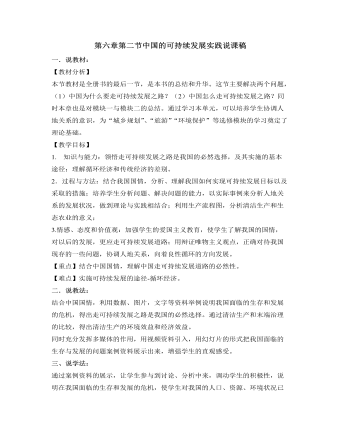
人教版高中地理必修2第六章第二节中国的可持续发展实践说课稿
1.导入新课:用触目精心的一首MTV《EARTHSONG》导入新课,引出人类已经面临严峻的人口、资源与环境的危机。而中国是世界上人口最庞大的国家,人口、资源与环境问题更加严重。既然我们知道了可持续发展的概况,了解了它的发展过程,从上节课内容的分析中,也理解了作为人类的发展,可持续是唯一的选择,也是我们所追求的目标,那么,具体到我们国家、我们周围的生产、生活情况又该如何呢?2.新课讲授:首先,通过三则补充材料的案例和课本上的内容分别说明庞大的人口压力,资源短缺和不合理利用,深刻的环境危机方面的问题,得出走可持续发展之路是我国的必然的唯一的选择。接着通过《中国21世纪议程》——中国21世纪人口环境与发展的白皮书的过渡引出实施可持续发展的途径。在这部分内容的讲解上,主要通过其中一种主要途径-循环经济的讲解,特别是对清洁生产和生态农业的具体分析,总结出中国走可持续发展之路事在必行,行必有果。再通过完成课本上最后一个活动题对本节内容进行深化。

人教版高中历史必修2二战后苏联的经济改革教案
⑤强调对外关系的灵活性。戈尔巴乔夫指出在对外政策中要采取多种办法选择不同的策略路线达到既定目标。在外交谈判中不要为自己制造死胡同,也不要给对方制造死胡同,要善于迎合伙伴,寻求接触点。在这种思想指导下,苏共采取的对外战略是以军控为中心的缓和战略,具体政策是继续与美国就裁军、消减核武器、限制地区冲突等问题进行谈判,缓解苏美关系;对西欧争取建立“全欧大厦”;对东欧实行纠偏、不干涉政策;对中国改善关系,实现关系正常化;调整与第三世界国家关系,解决阿富汗、柬埔寨等问题。 3、影响:①经济改革措施仓促上马,缺少宏观决策和相应的配套措施;加上戈尔巴乔夫没有放弃苏联的传统做法,继续优先发展重工业,致使改革未达到预期的效果,苏联经济持续下滑②经济体制改革受挫后,把改革的重点转向政治领域,最终导致国内局势的失控和苏联的解体。
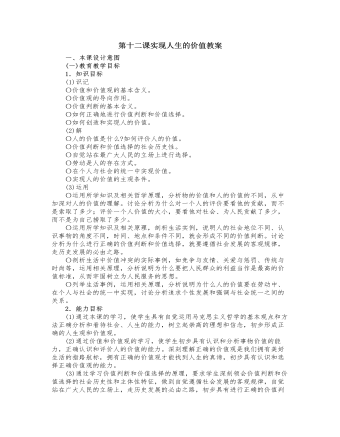
人教版高中政治必修4第十二课实现人生的价值教案
有的学者还指出,要坚持集体主义还必须将集体主义的价值精神与社会主义市场经济的要求结合起来,批判地继承计划经济时代倡导的集体主义,合理地对其进行体系结构的调整和内容的更新,形成新的集体主义。与传统的集体主义相比,这种新的集体主义应具有如下两个主要特点。其一,强调集体的出发点是为了维护集体成员的正当个人利益。传统的集体主义具有片面强调集体至上性、绝对性的弊端;新的集体主义必须依据社会主义市场经济的现实要求,将集体应当对个人承担的义务加以科学的阐释。真正的集体应该维护各个集体成员的个人利益,实现组成集体的各个主体的自我价值。这种新型的集体主义是对社会主义市场经济条件下社会关系的真实反映,既与个人主义有本质区别,也不同于传统的集体主义。其二,要体现道德要求的先进性与广泛性的统一。